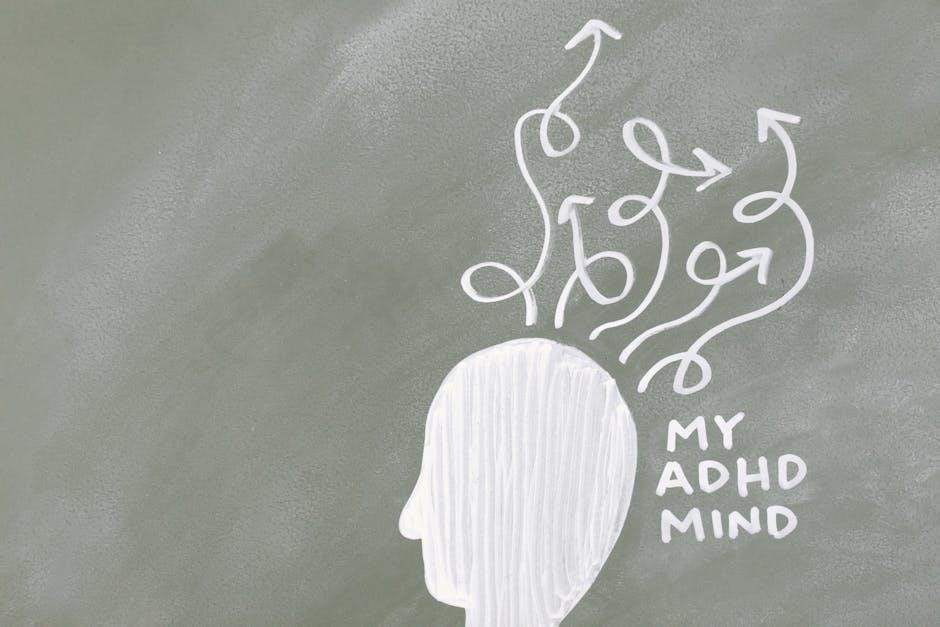Attention Deficit Disorder (ADD) is a neurodevelopmental condition characterized by symptoms of inattention‚ hyperactivity‚ and impulsivity. It is one of the most common childhood disorders‚ affecting both children and adults‚ often impacting daily functioning and quality of life. Early identification and understanding are crucial for effective management and support.
1.1 Definition and Overview
Attention Deficit Disorder (ADD) is a neurodevelopmental condition marked by persistent inattention‚ hyperactivity‚ and impulsivity. It is one of the most common childhood disorders‚ affecting both children and adults. ADD impacts daily functioning‚ relationships‚ and quality of life. Early identification and understanding are essential for effective management and support. The condition is often linked to brain development and function‚ requiring a comprehensive approach to address its effects.
1.2 Historical Context and Evolution of Understanding
Attention Deficit Disorder (ADD) has been recognized for over a century‚ with early descriptions of inattention and hyperactivity emerging in medical literature. Initially viewed as a childhood disorder‚ understanding evolved to include adult manifestations. Historical skepticism about its validity has given way to widespread recognition as a neurodevelopmental condition. Advances in research and diagnostic criteria have refined its classification‚ emphasizing the importance of early identification and tailored interventions. This evolution underscores the complexity of ADD and the need for ongoing awareness and education.
1.3 Importance of Awareness and Education
Awareness and education about Attention Deficit Disorder (ADD) are crucial for reducing stigma‚ promoting understanding‚ and ensuring early diagnosis. Educating individuals‚ families‚ and professionals fosters empathy and supports informed decision-making. Increased awareness helps identify symptoms early‚ enabling timely interventions and improving quality of life. National organizations and advocacy groups play a vital role in disseminating accurate information and resources. By prioritizing education‚ society can better accommodate and support individuals with ADD‚ fostering inclusivity and empowerment.

Symptoms of Attention Deficit Disorder
Common symptoms include difficulty staying focused‚ frequent distractions‚ impulsivity‚ and disorganization. These challenges affect daily tasks and can impact both children and adults‚ varying in severity.
2.1 Core Symptoms: Inattention‚ Hyperactivity‚ and Impulsivity
Attention Deficit Disorder (ADD) is characterized by three core symptoms: inattention‚ hyperactivity‚ and impulsivity. Inattention involves difficulty staying focused‚ following instructions‚ and completing tasks. Hyperactivity includes excessive fidgeting‚ restlessness‚ and an inability to remain still. Impulsivity manifests as interrupting others‚ acting without thinking‚ and difficulty waiting for one’s turn. These symptoms vary in severity and can impact daily functioning‚ relationships‚ and overall quality of life for both children and adults.
2.2 Symptoms in Children vs. Adults
Symptoms of Attention Deficit Disorder (ADD) vary between children and adults. Children often exhibit inattention‚ hyperactivity‚ and impulsivity‚ which can disrupt schoolwork and social interactions. Adults may experience similar challenges but often manifest them as disorganization‚ difficulty with time management‚ and emotional dysregulation. While children might show overt hyperactivity‚ adults are more likely to feel restless or have trouble staying focused during tasks. Understanding these differences is key to providing appropriate support and interventions for individuals across different age groups.
2.3 Common Misconceptions and Myths
Common misconceptions about Attention Deficit Disorder (ADD) include the belief that it is caused by poor parenting or excessive sugar intake‚ which are unfounded. Another myth is that individuals with ADD are lazy or lack intelligence‚ when in fact‚ it is a neurodevelopmental disorder. Some people assume that ADHD only affects children‚ but it often persists into adulthood. Additionally‚ the idea that there is a “cure” for ADHD is misleading‚ as management through therapy‚ lifestyle changes‚ and medication is typically required. Understanding these myths helps reduce stigma and promotes accurate awareness.

Diagnosis and Assessment
Diagnosis involves a comprehensive evaluation‚ including clinical interviews‚ behavioral assessments‚ and reviewing symptoms. Specialists like psychiatrists and psychologists play a key role in accurate diagnosis and treatment planning.
3.1 Diagnostic Criteria and Guidelines
The diagnostic criteria for ADHD‚ as outlined in the DSM-5‚ require at least five symptoms of inattention and/or hyperactivity-impulsivity to be present for at least six months. Symptoms must be present in two or more settings‚ such as home‚ school‚ or work‚ and cause significant impairment. A comprehensive evaluation‚ including clinical interviews and behavioral assessments‚ is essential for an accurate diagnosis. Specialists like psychiatrists and psychologists use standardized tools to assess symptom severity and rule out other conditions. Early and precise diagnosis is critical for effective treatment planning and support.
3.2 Challenges in Diagnosing ADHD
Diagnosing ADHD can be complex due to its overlapping symptoms with other conditions‚ such as anxiety or learning disabilities. The subjective nature of symptoms‚ reliance on patient and caregiver reports‚ and variability in presentation across ages add to the difficulty. Comorbid conditions often complicate accurate diagnosis‚ requiring thorough assessments. Additionally‚ cultural and societal factors can influence symptom interpretation‚ highlighting the need for standardized evaluation tools and expert clinical judgment to ensure precise and reliable diagnoses.
3.3 Role of Specialists: Psychiatrists‚ Psychologists‚ and Pediatricians
Psychiatrists‚ psychologists‚ and pediatricians play pivotal roles in ADHD diagnosis and management. Psychiatrists specialize in diagnosing and prescribing medications‚ while psychologists focus on behavioral assessments and therapies. Pediatricians often serve as the first point of contact‚ especially for children‚ providing initial evaluations and referrals. Collaboration among these specialists ensures comprehensive care‚ addressing both medical and psychological aspects of ADHD. Their expertise is essential for accurate diagnosis‚ tailored treatment plans‚ and ongoing support‚ helping individuals manage symptoms effectively and improve their quality of life.

Treatment Options for ADHD
ADHD treatment often involves a combination of medications‚ such as stimulants and non-stimulants‚ alongside psychosocial interventions like behavior therapy and cognitive behavioral therapy. Alternative approaches‚ including neurofeedback and mindfulness‚ are also explored to manage symptoms effectively.
4.1 Medications: Stimulants and Non-Stimulants
Stimulants‚ such as Adderall and Vyvanse‚ are first-line treatments for ADHD‚ helping to improve focus and reduce hyperactivity. Non-stimulants‚ like Strattera‚ are alternatives for those who don’t respond to stimulants or have certain health conditions. These medications work by balancing brain chemicals‚ such as dopamine and norepinephrine‚ to enhance attention and impulse control. Stimulants are effective for most patients‚ while non-stimulants offer a different mechanism of action with fewer side effects. Both options require careful medical supervision to ensure safety and efficacy‚ tailored to individual needs and responses.
4.2 Psychosocial Interventions: Behavior Therapy and Cognitive Behavioral Therapy
Psychosocial interventions‚ including behavior therapy and cognitive behavioral therapy (CBT)‚ are essential non-pharmacological approaches for managing ADHD. Behavior therapy focuses on teaching skills to manage symptoms‚ such as positive reinforcement and structured routines‚ while CBT helps individuals identify and change negative thought patterns. These therapies are often used alongside medication and are particularly effective for adults‚ addressing issues like time management and emotional regulation. They empower individuals to develop coping strategies‚ improving daily functioning and overall well-being.
4.3 Alternative and Emerging Treatments: Neurofeedback‚ Mindfulness‚ and Neuromodulation
Alternative treatments for ADHD include neurofeedback‚ which trains individuals to control brain activity‚ and mindfulness‚ which reduces stress and improves focus. Neuromodulation techniques‚ such as transcranial magnetic stimulation (TMS)‚ are also being explored. These approaches aim to address symptoms without medication‚ offering personalized solutions. Emerging therapies are gaining attention for their potential to complement traditional treatments‚ providing new hope for managing ADHD effectively. Research and advancements in these areas continue to expand treatment options for individuals with ADHD.

Lifestyle Changes and Management Strategies
Lifestyle adjustments play a crucial role in managing ADHD. A balanced diet‚ regular exercise‚ and consistent sleep hygiene can significantly improve focus and reduce symptoms‚ enhancing overall well-being.
5.1 Diet and Nutrition: Impact on ADHD Symptoms
A balanced diet rich in essential nutrients plays a significant role in managing ADHD symptoms. Foods high in Omega-3 fatty acids‚ such as fish and nuts‚ support brain health. Limiting artificial additives‚ preservatives‚ and excessive sugar can help reduce hyperactivity. A diet emphasizing whole foods‚ fruits‚ and vegetables provides sustained energy and focus. Proper nutrition not only alleviates symptoms but also promotes overall well-being‚ making it a key component of holistic ADHD management strategies.
5.2 Exercise and Physical Activity: Benefits for Focus and Behavior
Regular physical activity significantly improves focus‚ attention‚ and behavior in individuals with ADHD. Exercise boosts dopamine levels‚ enhancing brain function and cognitive performance. Activities like running‚ swimming‚ or team sports reduce hyperactivity and impulsivity while improving emotional regulation. Physical movement also promotes better sleep‚ which is crucial for managing ADHD symptoms. Incorporating exercise into daily routines can lead to long-term benefits‚ making it a vital component of a comprehensive ADHD management plan.
5.3 Sleep Hygiene: Importance for Managing ADHD
Sleep hygiene plays a critical role in managing ADHD symptoms. Poor sleep quality can exacerbate inattention‚ hyperactivity‚ and impulsivity‚ while consistent routines improve focus and behavior. Establishing a calming bedtime environment‚ avoiding screens before bed‚ and maintaining a regular sleep schedule are essential strategies. Addressing sleep issues can significantly enhance overall well-being and symptom management‚ making it a cornerstone of ADHD care.

Resources and Support
National organizations like CHADD and CDC provide essential resources‚ while online communities and forums offer peer support. Educational materials and guides help individuals and families manage ADHD effectively.
6.1 National Organizations and Advocacy Groups
National organizations like CHADD (Children and Adults with Attention-Deficit/Hyperactivity Disorder) and the CDC (Centers for Disease Control and Prevention) provide comprehensive resources and support. These groups offer detailed information on ADHD symptoms‚ diagnosis‚ and treatment options‚ along with links to local services. Advocacy groups play a crucial role in raising awareness‚ reducing stigma‚ and promoting understanding of ADHD. They often host events‚ webinars‚ and workshops to educate the public and support individuals and families affected by the condition.
6.2 Online Communities and Forums
Online communities and forums provide valuable support and resources for individuals with ADHD. Platforms like ADDitude Magazine‚ ADHD subreddit‚ and Understood.org offer spaces for sharing experiences‚ advice‚ and strategies. These forums help reduce feelings of isolation and provide practical insights into managing ADHD. They often feature expert Q&A sessions‚ personal stories‚ and tips for daily living. Engaging with these communities can empower individuals and families to navigate challenges effectively and stay informed about the latest developments in ADHD management.
6.3 Educational Materials and Guides
Educational materials and guides on ADHD are widely available‚ offering comprehensive insights into understanding and managing the condition. The CDC provides detailed guides on symptoms‚ diagnosis‚ and treatment options‚ while organizations like CHADD and Understood.org offer downloadable resources‚ including infographics and checklists. These materials cater to parents‚ educators‚ and individuals with ADHD‚ covering topics such as behavior management‚ study skills‚ and workplace strategies. They emphasize evidence-based approaches and practical tips‚ making them invaluable for fostering awareness and empowerment.

ADHD in Specific Populations
ADHD affects diverse groups‚ including children‚ adults‚ and preschool-aged individuals‚ each presenting unique challenges. Early signs in children‚ adult-specific struggles‚ and special considerations for young learners are key focuses.
7.1 ADHD in Children: Early Signs and Interventions
ADHD in children often manifests as difficulty paying attention‚ impulsivity‚ and hyperactivity. Early signs include frequent distractions‚ forgetfulness‚ and disruptive behavior. Interventions focus on behavioral therapy‚ parent training‚ and school support. Medications may be considered if symptoms are severe. Early diagnosis and tailored strategies are crucial for improving outcomes and fostering healthy development. Collaborative efforts between parents‚ educators‚ and healthcare providers ensure comprehensive care and long-term success for children with ADHD.
7.2 ADHD in Adults: Unique Challenges and Strategies
ADHD in adults presents unique challenges‚ including difficulty maintaining relationships‚ employment‚ and daily routines. Symptoms like disorganization‚ impulsivity‚ and restlessness often persist‚ impacting quality of life. Strategies for managing adult ADHD include cognitive-behavioral therapy‚ mindfulness practices‚ and lifestyle adjustments. Medications‚ such as stimulants‚ may also be prescribed. Adults benefit from structured routines‚ time management techniques‚ and support systems. A tailored approach addressing specific needs is essential for improving focus‚ reducing stress‚ and enhancing overall well-being in adults with ADHD.
7.3 ADHD in Preschool-Aged Children: Special Considerations
ADHD in preschool-aged children requires careful consideration due to their developmental stage. Behavioral therapy is often the first-line treatment‚ focusing on improving attention and reducing hyperactivity. Medications may be considered if symptoms are severe and unresponsive to behavioral interventions. Early identification and intervention are critical to support social‚ emotional‚ and cognitive development. Parents and caregivers play a vital role in providing structured environments and consistent routines. Collaborative efforts between families and specialists ensure tailored strategies to address unique needs and promote healthy growth in young children with ADHD.

The Role of Education and School Interventions
School interventions‚ such as IEP/504 plans‚ provide tailored support for students with ADHD‚ ensuring academic success and behavioral management through collaborative efforts between teachers‚ parents‚ and specialists.
8.1 School Accommodations and IEP/504 Plans
School accommodations and IEP/504 plans play a vital role in supporting students with ADHD. These plans provide tailored academic and behavioral strategies‚ ensuring access to a free and appropriate education. Accommodations may include extended time for tests‚ use of assistive technology‚ and preferential seating. Behavioral interventions‚ such as positive reinforcement‚ help manage symptoms. Collaboration between parents‚ educators‚ and specialists is key to developing effective plans that address individual needs and promote academic success. These plans are regularly reviewed and updated to ensure ongoing support.
8.2 Teacher Training and Classroom Strategies
Teacher training and classroom strategies are essential for supporting students with ADHD. Educators learn to create structured‚ predictable environments and use behavioral techniques like positive reinforcement. Classroom strategies include clear instructions‚ visual reminders‚ and breaking tasks into smaller steps. Teachers also benefit from training on ADHD-specific interventions‚ such as minimizing distractions and providing individualized support. These approaches help students stay focused‚ reduce disruptive behaviors‚ and improve academic performance. Ongoing professional development ensures teachers are equipped to meet the unique needs of students with ADHD effectively.
8.3 Parent-School Collaboration: Key to Success
Parent-school collaboration is vital for supporting students with ADHD. Open communication and teamwork between parents and educators ensure consistent strategies at home and in the classroom. Schools often involve parents in developing IEP/504 plans‚ tailoring interventions to meet individual needs. Parents can provide insights into their child’s behavior and responses to specific techniques. Regular updates and progress reports help align efforts‚ fostering a supportive environment. This partnership enhances academic and behavioral outcomes‚ ensuring the child’s needs are consistently addressed in all settings.

Research and Innovations
Research on ADHD is advancing rapidly‚ with groundbreaking studies and innovative therapies emerging. Companies like 3Z Pharmaceuticals and Shire are leading developments in neurodevelopmental treatments.
9.1 Recent Studies and Breakthroughs
Recent studies highlight advancements in ADHD research‚ including the development of neurofeedback‚ cognitive training‚ and mindfulness-based interventions. These emerging therapies show promise in managing symptoms. Pharmaceutical companies like 3Z Pharmaceuticals and Shire are pioneering new treatments‚ focusing on innovative drug formulations. Breakthroughs in understanding the neurodevelopmental aspects of ADHD are reshaping diagnostic and therapeutic approaches‚ offering hope for more personalized and effective care. Ongoing research continues to explore the complex interplay of genetics‚ environment‚ and brain function in ADHD.
9.2 Emerging Therapies and Technologies
Emerging therapies for ADHD include neurofeedback‚ cognitive training‚ and mindfulness-based approaches‚ which focus on improving attention and self-regulation. Advances in neuromodulation‚ such as transcranial magnetic stimulation (TMS)‚ are being explored for their potential to manage symptoms. Additionally‚ innovative technologies like wearable devices and mobile apps are being developed to monitor and support individuals with ADHD. These tools offer personalized interventions and real-time feedback‚ enhancing traditional treatment methods. Such advancements highlight the growing integration of technology in ADHD care‚ providing new avenues for effective management.
9;3 The Role of Pharmaceutical Companies in ADHD Research
Pharmaceutical companies play a pivotal role in advancing ADHD research and treatment development. Companies like 3Z Pharmaceuticals‚ Shire‚ and Takeda are driving innovation through groundbreaking studies and therapeutic advancements; They invest heavily in developing new medications‚ including stimulants and non-stimulants‚ and explore emerging therapies like neuromodulation. These efforts have led to improved treatment options‚ addressing both pediatric and adult ADHD. Their contributions are essential for enhancing understanding and improving outcomes for individuals with ADHD‚ ensuring access to effective and personalized care.

Awareness and Advocacy
ADHD Awareness Month in October highlights the importance of reducing stigma and promoting understanding. Personal stories and advocacy efforts help educate communities and support individuals with ADHD.
10.1 ADHD Awareness Month: October
October is recognized as ADHD Awareness Month‚ focusing on promoting understanding and reducing stigma. This initiative highlights the diverse experiences of individuals with ADHD‚ emphasizing education and advocacy. Personal stories and expert insights are shared to foster empathy and support. The month encourages open discussions about ADHD‚ dispelling myths and raising awareness of its impact on daily life. Resources and events are widely distributed to help communities better understand and assist those affected. Advocacy efforts aim to create a more inclusive and supportive environment for individuals with ADHD.
10.2 Reducing Stigma and Promoting Understanding
Reducing stigma around ADHD requires education and open conversations. Many misconceptions surround the disorder‚ often leading to judgment or misunderstanding. Sharing personal stories and experiences helps humanize ADHD‚ fostering empathy and acceptance. Encouraging dialogue in schools‚ workplaces‚ and communities promotes a supportive environment. Accurate information and resources can dispel myths‚ highlighting ADHD as a neurodevelopmental condition rather than a personal failing. By fostering understanding‚ society can create a more inclusive space for individuals with ADHD to thrive without fear of stigma or discrimination.
10.3 Personal Stories and Success Tales
Personal stories from individuals with ADHD highlight resilience and achievement‚ offering inspiration and hope. Experts like Ned Hallowell‚ MD‚ and Justin Barterian‚ PhD‚ share insights into thriving with ADHD‚ emphasizing creativity and skill-building. These narratives demonstrate how individuals can harness their unique strengths to succeed. By sharing experiences‚ people with ADHD reduce stigma and inspire others to embrace their differences. Such stories foster a sense of community and motivation‚ proving that ADHD does not define one’s potential for a fulfilling life.
Attention Deficit Disorder (ADD) is a prevalent neurodevelopmental condition impacting daily life. Effective management through awareness‚ education‚ and tailored strategies fosters improved outcomes and overall well-being.
11.1 Summary of Key Points
Attention Deficit Disorder (ADD) is a neurodevelopmental condition marked by inattention‚ hyperactivity‚ and impulsivity. It affects both children and adults‚ impacting daily functioning. Early diagnosis and tailored interventions‚ such as medication‚ therapy‚ and lifestyle changes‚ are essential for managing symptoms. Education and awareness play a critical role in reducing stigma and promoting understanding. By fostering a supportive environment and utilizing available resources‚ individuals with ADD can lead fulfilling lives. Continued research and advocacy are vital for improving outcomes and advancing treatment options.
11.2 The Future of ADHD Management and Research
Future ADHD management will focus on personalized treatments‚ combining medication‚ therapy‚ and lifestyle interventions. Emerging therapies like neurofeedback‚ cognitive training‚ and neuromodulation show promise. Research emphasizes understanding ADHD’s biological roots‚ leveraging advancements in genetics and brain imaging. Pharmaceutical innovations‚ such as extended-release medications‚ aim to improve efficacy and reduce side effects. Technology‚ including AI-driven diagnostic tools‚ will enhance early detection and tailored interventions. Advocacy and education will remain critical in fostering acceptance and improving care‚ ensuring individuals with ADHD thrive in all aspects of life.
11.3 Encouragement for Further Learning and Advocacy
Continued education and advocacy are vital for improving ADHD understanding and support. Encourage individuals to explore resources from organizations like CHADD and CDC‚ which offer comprehensive guides and tools. Promoting awareness helps reduce stigma and fosters inclusive environments. Advocating for research funding and policy changes ensures better access to care. By sharing personal stories and successes‚ individuals can inspire others and build a supportive community. Stay informed‚ engage in discussions‚ and champion initiatives that empower those with ADHD to thrive.

